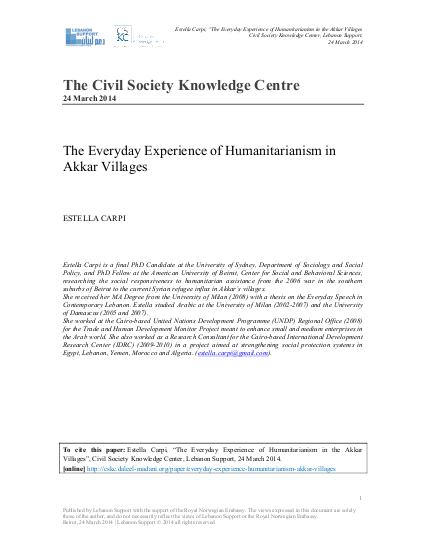
Within the framework of the Syrian humanitarian crisis, this paper aims to understand the way everyday practices are changing in response to humanitarian programmes currently in place in North Lebanon, through the use of a bottom-up ethnographic approach. Rather than delving deeper into the technical analysis of humanitarian policies and programmes, the fieldwork focused on the everyday experience of beneficiaries, from the local and the new refugee communities. The present paper will examine the qualitative changes that the humanitarian market has been engendering over the past two years, concerning the massive flow of refugees into Lebanon.
People’s accounts suggest that the Syrian refugee community is becoming frustrated with the alleged neutrality and depoliticisation of humanitarian assistance, which merely aims at alleviating their suffering, without concrete action to put an end to the war in Syria. On one side, the initial ethnicisation of needs implied that beneficiaries were placed in specific categories before being granted access to services; the reiterated use of aid provision as a strategy to gain international legitimacy politicised humanitarian assistance further. On the other side, interviewed humanitarian practitioners revealed how they continue to defend the "alleviation-of-suffering" logic.
This research was carried out through in-depth interviews with faith-based, secular, international, and local organisations, as well as participatory observation of the day to day living of aid beneficiaries and non-beneficiaries. The paper aims at elaborating a data-driven critique of the impact of non-state structures – which proliferate in the emergency sphere, in which Lebanon finds itself entangled – on the rarely studied everyday life, in order to able to transcend macroscopic perspectives.